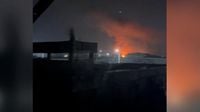In a dramatic escalation of military tensions between India and Pakistan, Pakistan has reported that India launched missiles targeting key military bases, including one near the capital, Islamabad. This incident marks a significant increase in hostilities between the two nuclear-armed neighbors, which have been embroiled in conflict for decades.
According to Pakistan's military, the missile strikes occurred shortly after midnight on Wednesday, May 7, 2025. The Pakistani authorities described the attacks as an unprovoked act of aggression and stated that they would not go unanswered. "We have launched an operation against India in retaliation to those latest strikes," a military spokesperson said.
India, on the other hand, justified its military action by claiming it was targeting terrorist infrastructure located in both Pakistan and Pakistan-administered Kashmir. An official statement from the Indian government emphasized that the operation was necessary to ensure national security. "We cannot allow terrorist activities to go unchecked," the statement read.
Eyewitness accounts from the city of Muzaffarabad reported multiple loud explosions, which were captured in video footage shared by Reuters. Residents expressed fear and confusion as the sounds of warfare echoed through their neighborhoods. Local authorities have been mobilized to assess the damage and provide assistance to those affected.
The international community is closely monitoring the situation, with calls for restraint coming from various global leaders. Diplomatic channels are reportedly being utilized to de-escalate tensions, but the situation remains precarious. Both countries have a history of military confrontations, and the potential for further conflict is high.
In a separate but equally significant political development, Cardinal Robert Prevost from the United States has been elected as the 267th pope of the Catholic Church, becoming the first American pontiff in history. In his inaugural speech, delivered to a roaring crowd, Prevost emphasized the need for the Church to “build bridges” and acknowledged the legacy of the late Pope Francis.
Prevost’s election comes at a time when the Catholic Church is facing numerous challenges, including declining membership and internal divisions. His call for unity and reconciliation may resonate with many within the Church as it navigates these turbulent waters.
Meanwhile, in Germany, Friedrich Merz has formally assumed the role of chancellor after a tumultuous political journey. Following an unprecedented defeat that highlighted deep discontent within his coalition, Merz was approved in a hastily organized session where 325 lawmakers voted in favor of his appointment, surpassing the 316 votes needed.
Merz’s leadership will be tested as he faces a divided parliament and pressing issues ranging from economic recovery to climate change. His previous attempts to form a government faced significant hurdles, but his recent victory indicates a potential shift in the political landscape.
In Ukraine, a fragile ceasefire has been declared by Russian President Vladimir Putin, who instructed his troops to observe a three-day pause in hostilities. The Kremlin claims this is a gesture of goodwill, but Ukrainian President Volodymyr Zelensky has dismissed the announcement as a mere stunt, urging for a more extended 30-day ceasefire to genuinely address the ongoing conflict.
The situation remains tense, with both sides remaining on high alert. Ukrainian officials continue to call for international support as they navigate the complexities of the conflict, which has resulted in significant loss of life and displacement.
In another part of the world, Israel is battling wildfires that have forced drivers on Highway 1 near Jerusalem to abandon their vehicles. Over 100 firefighting teams are working tirelessly to control the blazes, which have posed a serious threat to both lives and property. Authorities are urging residents to remain vigilant and adhere to safety protocols as the fires continue to spread.
In Canada, Prime Minister Mark Carney has made headlines following a meeting with President Trump at the White House. Carney publicly urged Trump to cease his threats to annex Canada, stating firmly that Canada “won’t be for sale ever.” This exchange highlights the ongoing tensions between the two nations and the complexities of international relations in the current political climate.
In a tragic incident, a car rammed into a crowd in Vancouver during a festival celebrating Filipino heritage, resulting in at least nine fatalities. The event, which was meant to be a joyous occasion, turned into a scene of chaos and heartbreak. Officials are investigating the circumstances surrounding the incident but have indicated there is no evidence suggesting it was an act of terrorism.
Lastly, a devastating explosion at the port of Bandar Abbas in southwestern Iran has resulted in over two dozen fatalities and hundreds of injuries, according to Iranian state media. The explosion, which occurred on May 6, 2025, has raised concerns about safety regulations and emergency preparedness in the region.
As these significant events unfold across various regions, the world watches closely, hoping for resolutions that prioritize peace and stability. The interconnectedness of these stories underscores the complexities of global politics and the urgent need for diplomatic efforts to address ongoing conflicts.




